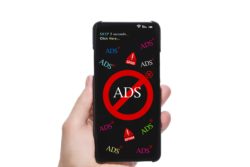Top Class Actions’s website and social media posts use affiliate links. If you make a purchase using such links, we may receive a commission, but it will not result in any additional charges to you. Please review our Affiliate Link Disclosure for more information.
If you are being harassed with many unsolicited coupon text messages, filing a TCPA lawsuit may be an option for stopping the harassment.
What Is a Coupon Text?
Advancing technology has made it increasingly easy for retailers to reach out to potential consumers. Unfortunately, these contacts may come in the form of bothersome coupon texts. These spam texts, offering deals and price reductions on a range of goods and services, are just one way that companies attempt to reel in customers and make a sale.
They can be helpful if you are interested in the product offered, but more often than not, they can be annoying. This is partly because many businesses may fire off thousands of coupon texts at once. Sometimes, they may send them off to random numbers, even to those recipients who did not sign up to receive such messages, or whose numbers are on the National Do Not Call list.
The National Do Not Call Registry was created by the Federal Trade Commission (FTC) in order to protect consumers from unwanted sales calls. The registry can be used for both home phones and cell phones, and is free to register. Its primary function is providing a list of consumers who have opted out of receiving these kinds of calls for businesses to determine who they should not call.
Despite the list, some businesses may call or text anyway—but generally, unwanted calls or texts that defy the Do Not Call list are from scammers who are willing to ignore these laws. Also, the registry will not prevent legitimate businesses from sending you coupons by text if you have already given them express written consent to send these coupons, though you should be provided a way to easily opt out of these coupon text messages.
Can You Stop Receiving Coupons by Text?
The Telephone Consumer Protection Act is one federal law aiming to protect consumers from bothersome coupon texts and other unwanted forms of telemarketing. The law aims to particularly address mass messages and impersonal communications sent to many people at once.
The TCPA was introduced back in 1991. In the nearly three decades since, technology has shifted and telemarketers have begun using new tactics, but the TCPA has expanded as well. Now, it covers new methods of advertising communications, such as robocalls, spam text messages, and more.
And, in the last few decades, the TCPA has become more essential than ever as the number of robocalls has continued to increase at an alarming rate, with Americans reportedly being hit with about 58.5 billion robocalls in 2019 alone.
The Federal Communications Commission explains that the best way to stop spam messages is to prevent them from happening in the first place. These messages can be hard to stop, particularly if your phone number has already fallen into the wrong hands.
The FCC advises consumers to be judicious about to whom they give their number. Some retailers and companies may share their contact lists with other retailers, so you can easily end up getting messages and coupon texts from retailers other than those you initially wanted to contact.
Many business transactions and web forms may subtly ask a customer to “opt in” to promotional texts. It’s always important to read the fine print, so you do not accidentally say “yes” to receiving coupon texts from retailers. Web forms are one place that consumers may end up inadvertently sign up for promotional messages.
If you did end up receiving text messages from a retailer with whom you did business, the company should provide you with an “opt out” option from these messages. A coupon text may inform you that you can text “STOP” or similar to opt out of future messages. This is a good option for a known retailer.
However, the FCC advises consumers against responding to a message from an unknown source, even to opt out. In this instance, you may expose yourself to potential fraud. Instead, you can block the number or ignore the message. Some wireless providers also invite customer to forward unwanted texts to the provider to have them marked as “spam.”
 Have Any Coupon Text Lawsuits Been Filed?
Have Any Coupon Text Lawsuits Been Filed?
Some retailers may disregard the TCPA’s requirements in the interest of making a sale. However, consumers have been fighting back against this practice by filing coupon text lawsuits and other TCPA lawsuits. In these cases, consumers have challenged a range of unlawful practices, such as sending messages without the recipient’s consent, sending mass messages, or failing to heed a customer’s request to opt out of messages.
Modern Restaurant Management cautions restaurants from sending too many spam texts and promotional texts, recounting some instances in which businesses have been sued for these practices. According to the publication, Kohl’s was sued for a TCPA violation in which customers claimed that the retailer did not ask for consent before sending an ad for customers to receive a 15% off coupon if they text the word “SAVE” to Kohl’s.
Dozens of major companies have been in the center of class action lawsuits filed over coupon spam texts that allegedly violate the TCPA. In some cases, coupon text TCPA lawsuits have been settled for millions of dollars. In one instance, an Abercrombie & Fitch TCPA lawsuit was brought to an end with a $10 million settlement agreement. The lead plaintiff had claimed that she not only never gave her consent to receive these texts in the first place, but she also wasn’t given a way to opt out of receiving them once they started. The TCPA requires that consumers be given a clear method of opting out of these kinds of texts and robocalls, even in situations where they have initially agreed to receive them.
When Should You File a Coupon Text Lawsuit?
If you are being hounded by unwanted coupon texts, and you’ve made a number of unsuccessful attempts to get them to stop, you may want to file a coupon text lawsuit. Sometimes, the threat of legal action can inspire a company to change their coupon text practices, and may encourage them to follow the TCPA’s requirements.
What Damages Could You Receive?
In the Kohl’s TCPA lawsuit and in many others, customers sued for multiple violations of the TCPA — they argued that each message sent without permission violated the TCPA. The National Law Review explains that consumers can seek up to $500 per unknowing or negligent violation of the TCPA, and up to $1,500 per willful or knowing violation of the law.
In the case coupon texts, this means that a business could face up to $1,500 in fines for each text message that they send out en masse without a recipient’s consent. This can quickly add up, as many businesses send multiple messages to thousands of recipients each day.
Filing a Coupon Text Lawsuit
A growing number of people are coming forward against companies with allegations of illegal coupon spam texts.
If you have received spam text coupons from a clothing store or restaurant without having first given express written consent to receive these texts, you may be able to file a lawsuit and pursue compensation. In many cases, countless other people may have also received these text coupons from the same company, and you may be able to file a class action lawsuit that can help you and other class members recover compensation, as well as hold the company responsible for its actions.
Filing a lawsuit can be a daunting prospect, so Top Class Actions has laid the groundwork for you by connecting you with an experienced attorney. Consulting an attorney can help you determine if you have a claim, navigate the complexities of litigation, and maximize your potential compensation.
In order to make your claim as effective as possible, keep digital and written record of any relevant unwanted text communications that may be considered evidence.
Join a Free Text Message Coupon Class Action Lawsuit Investigation
If you have received coupons or sales advertisements in a text message from a restaurant or clothing retailer and your phone number is registered with the National Do Not Call registry, you may be entitled to compensation.
This article is not legal advice. It is presented
for informational purposes only.
ATTORNEY ADVERTISING
Top Class Actions is a Proud Member of the American Bar Association
LEGAL INFORMATION IS NOT LEGAL ADVICE
Top Class Actions Legal Statement
©2008 – 2024 Top Class Actions® LLC
Various Trademarks held by their respective owners
This website is not intended for viewing or usage by European Union citizens.


 Have Any Coupon Text Lawsuits Been Filed?
Have Any Coupon Text Lawsuits Been Filed?

7 thoughts onWhen Should You File a Coupon Text Lawsuit?
Add me
I get so many robot calls and text messages that I do not get up to answer my phone anymore. If someone is calling that I need to talk to and I do not have their name and number in my phone, then I do not answer the call.
I would love to make their lives as miserable, as they have made mine.
add me
Add me
I have been receiving an increasing amount of spam text messages and calls from a bunch of different people. One company keeps calling stating that if I do not want my card charged of $399 I need to call them back. Another text states that they have been trying to deliver me a package since June and I should call them. I haven’t ordered anything that I didn’t receive. Yet another stated that I am going to receive $799 to my CashApp account….but I don’t have a CashApp account. I have numbers upon numbers saved and flagged in my phone! How do I stop this when I am already on the Do Not Call Registry?!
Add me please
Please add me